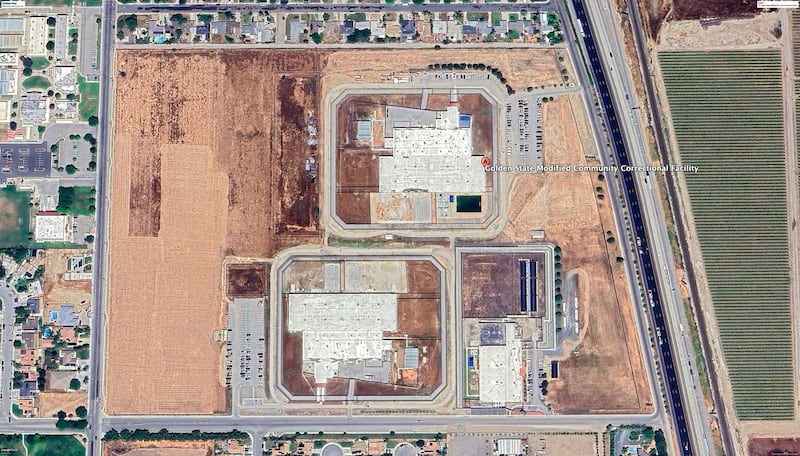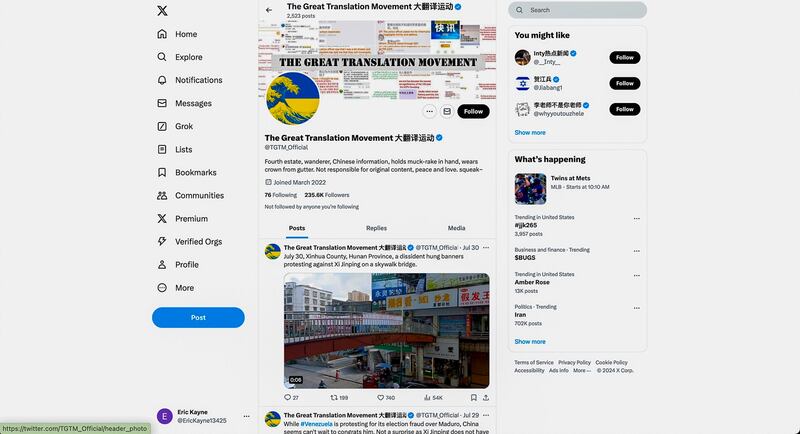Calls are growing for the release of Hong Kong translator and social media activist Yuen Hong Tam, 22, who is currently in immigration detention after seeking political asylum in the United States amid a crackdown on dissent at home, Radio Free Asia has learned.
Tam, who is currently being held in immigration detention at California's Golden State Annex, was detained after arriving in the United States at the end of March, seeking political asylum.
Since 2022, he had been volunteering for a social media account known as the Great Translation Movement, an anonymous Twitter account offering raw translations of online comment from Chinese social media that has been widely criticized by Chinese state media for "smearing" China.
The Great Translation Movement X account called on July 13 for his release.
"One of the editors of The Great Translation Movement, Yuen Hong Tam, has been detained in Golden State Annex by U.S. Immigration and Customs Enforcement for seeking asylum in California since March," the group said. "We are deeply concerned for his well-being and call for his immediate release from ICE."
It said Tam had translated "caricatures satirizing the Chinese Communist Party regime's repression of Hong Kong" and helped to "expose the hypocrisy of totalitarian propaganda."

His name and identity have been made public and he is vulnerable to being targeted by the authorities under Hong Kong's Law on Safeguarding National Security, also known as Article 23 legislation, the group said, adding: "We firmly believe in freedom of speech and freedom from fear for all people."
Former 1989 Tiananmen protest leader Wang Dan told RFA Mandarin that he is drafting an open letter to the U.S. Congress in support of the Great Translation Movement in a bid to free Tam and ensure none of its other activists are held in immigration prisons.
The U.S.-based China Democracy Party held a rally in support of the group outside the Chinese Consulate in Los Angeles on July 28.
National security crackdown
Tam told RFA Mandarin in an interview from detention on Tuesday that he left Hong Kong amid an ongoing crackdown on political dissent under two stringent national security laws, the second of which was passed on March 23, fearing that his online activism could land him in jail.
"I made posts, contacted other dissidents, and helped them to translate and publicize stuff," Tam said.
The Great Translation Movement angered Chinese officials by making some of the least savory comments on the country's social media visible to a global audience.
State media were writing articles slamming the account as "a malicious smear campaign against China."
The nationalistic Global Times newspaper accused the account's translators of "extracting niche and radical comments from the Chinese internet... colluding with other anti-China forces and claiming to show foreigners the 'true face' of Chinese netizens.
"The image of China and Chinese people in their depiction has been arrogant, populist, cruel and bloodthirsty, forcibly presented by them to the world through the use of various pejorative terms," the paper said in a March 22, 2024 article.
"Collusion with foreign forces" is a crime under the 2020 National Security Law in Tam's native Hong Kong, while China's own national security law "punishes acts of infiltration, destruction, subversion or separatism by foreign influences," according to the China Law Translate blog .

So when authorities in his home city of Hong Kong passed the " Article 23" security law with a penalty of life imprisonment for some forms of banned public speech, Tam feared he would be arrested and put on trial for his activities.
"I saw that Article 23 was about to be passed, and my feeling was that the oppression would escalate," he said. "I was afraid of being punished under Article 23, and so I wound up coming here."
In Taiwan, the ruling Democratic Progressive Party condemned the passing of the law as the "darkest day" for Hong Kong, warning that the new law's more expansive interpretations of national security crimes would "completely destroy what Hong Kong has left in the way of human rights or a legal system."
Take a moment to read more
[ Calls grow for UK to expand lifeboat scheme for Hong KongersOpens in new window ]
[ Interview: Beijing reaction to Hong Kong protests 'tragedy' for city's autonomyOpens in new window ]
[ China extends crackdown on rights lawyers to Hong KongOpens in new window ]
[ Censored back home, Hong Kong authors are publishing in TaiwanOpens in new window ]
‘A high degree of psychological pressure’
The U.S. State Department said in February that the legislation "risks compounding the 2020 National Security Law that has curtailed the rights and freedoms of people in Hong Kong."
Describing himself as "desperate" at that time, Tam feels that his current situation in immigration detention is still better than languishing in a Hong Kong jail.
"Physically I'm in a good state," Tam said. "I'm not going to go hungry, and there is air conditioning 24 hours a day, so everything's fine."
"But I'm experiencing a high degree of psychological pressure, which is inevitable," he said.
Tam, whose court asylum hearing has been scheduled for Sept. 16, currently spends his days "sleeping, eating, watching TV and movies, or going online on my tablet and reading the news."
Tam is being represented by a pro-democracy law firm founded by activist Zheng Cunzhu, who said Tam was denied bail on a technicality because he had arrived in the U.S. legally, on a tourist visa, rather than smuggling himself across the border like thousands of others.

Fellow Great Translation Movement activist Aaron Chang said the group wanted to show the world how the Chinese Communist Party whips up extreme nationalistic sentiment to serve its own political goals.
"The premise of our translations is that extreme nationalism has reached a serious level in China, while the Chinese government has been covering it up in its external propaganda," Chang said.
An 18-year-old Hong Kong activist who uses the social media handle Fragile Bard said Tam had previously translated a speech he gave during a protest outside the Chinese Consulate in Los Angeles.
"He also told me he planned to apply for asylum in the United States," the activist said. "It wasn't until he got to the immigration prison that he called me and told me about his situation, which didn't turn out as well as he had imagined."
Translated by Luisetta Mudie.
